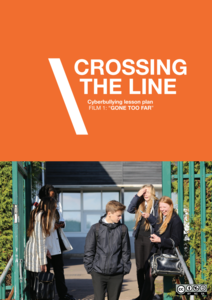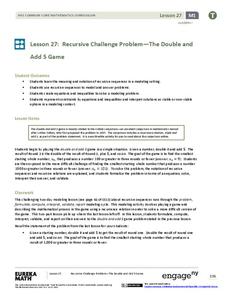Childnet International
Crossing the Line: Cyberbullying
Members of the LGBTQ community are more likely to be bullied online than their peers—and bystanders who do nothing can be as problematic as the bullies themselves. Middle schoolers explore ways to protect themselves and others on the...
Science Matters
Peanut Energy
How do humans get energy since they aren't mechanical and can't photosynthesize? Learners explore this question by relating potential energy in food to human energy levels. Scholars measure the change in mass and a change in...
EngageNY
Solving Percent Problems II
Fill in the blanks to find the best discount! Groups complete a table of amounts and percents associated with sale items. Classmates then find the original cost, sale cost, discount amount, paid percent, or the discount percent...
Code.org
Practice PT - Design a Digital Scene
The final performance task for the unit requires class members to utilize what they have learned to create a personal digital scene. Groups work together to develop a scene and then, using top-down design, break the scene into...
EngageNY
Recursive Challenge Problem—The Double and Add 5 Game
As a continuation of a previous activity, this activity builds on the concept of calculating the terms of a sequence. Pupils are challenged to determine the smallest starting term to reach a set number by a set number of rounds. Notation...
Give and Let Live
Blood and Transplant: Blood
Why is blood donation so important, anyway? Science and health classes across multiple grades benefit from an in-depth look into the need for and process of blood donation. With an emphasis on presenting the topic in a non-threatening...
Childnet International
Self Esteem
To middle schoolers, there's nothing worse than being excluded from a peer group. Developing important self-esteem skills can not only get them through awkward adolescent times, it can carry them through the rest of their lives as...
California Department of Education
Safe at Work
From minimum wage to minimizing injuries, young workers need to know their rights! The sixth and final lesson plan in a series of college and career readiness activities gets eighth graders thinking about safety and labor laws.
Huntington Library
Religion & Spirituality - Exploring the California Missions
The California missions were built with the hope of converting the local Native Americans to Catholicism, but exactly how different were their beliefs to begin with? Through analysis of a series of primary source documents,...
Illustrative Mathematics
Representing Half of a Circle
Geometric shapes make great visual models for introducing young mathematicians to the concept of fractions. Looking at a series of four circles, learners are asked to determine whether or not one half of each circle is shaded. To support...
Curated OER
Understanding Symmetry Through Visual Art
Have your class explore symmetry, radial balance and fractional parts in natural and man-made objects in their environment. Learners list examples and identify symmetrical and asymmetrical designs. Pupils are given a box of crayons and...
EngageNY
Equivalent Ratios II
What is the connection between equivalent ratios? Class members first find the multiplication factor used to create equivalent ratios. Next, they take that information to determine whether ratios are equivalent. The second lesson on...
Skyscraper Museum
What is a Skyscraper?
Skyscrapers are amazing feats of architectural design that create the iconic skylines of the world's biggest cities. Young architects explore the defining characteristics of these monstrous towers with the first instructional activity in...
Huntington Library
Everyday Life - Exploring the California Missions
Young scholars relive history as they examine primary sources that document everyday life in the California missions. During a class viewing of the included slideshow presentation, children analyze documents, paintings, and...
EngageNY
Recursive Challenge Problem—The Double and Add 5 Game
Math is all fun and games! Use a game strategy to introduce the concept of sequences and their recursive formulas. The activity emphasizes notation and vocabulary.
EngageNY
Positive and Negative Numbers on the Number Line—Opposite Direction and Value
Make your own number line ... using a compass. The first installment of a 21-part series has scholars investigate positive and negative integers on a number line by using a compass to construct points that are the same distance from zero...
EngageNY
Interpreting and Computing Division of a Fraction by a Fraction—More Models
Use a unit approach in developing a fraction division strategy. The teacher leads a discussion on division containing units, resulting in a connection between the units and like denominators. Pupils develop a rule in dividing fractions...
Baylor College
Needs of Living Things: Pre-Assessment
Determine your class's prior knowledge about the necessities of life with this pre-assessment for a unit on living things. Learners draw pictures of themselves with all the things they need to live, grow, and survive. These drawings will...
Science Matters
Earthquake Building/Shaking Contest
Japan is one of only a handful of countries that constructs buildings that are almost earthquake proof. The 13th lesson in the 20-part series challenges scholars to build structures to test against earthquakes. With limited materials and...
Peace Corps
Culture is Like an Iceberg
What influences the way you dress, or celebrate holidays, or connect with your friends? Explore the cultural traits that are not easily seen with an engaging discussion. Using the model of an iceberg, learners place features of culture...
EngageNY
Solving General Systems of Linear Equations
Examine the usefulness of matrices when solving linear systems of higher dimensions. The lesson asks learners to write and solve systems of linear equations in four and five variables. Using matrices, pupils solve the systems and apply...
Virginia Department of Education
Types of Variations
Scholars determine how two quantities vary with respect to each other. They complete a fill-in-the-blank activity by stating whether the entities vary directly, inversely, or jointly, create equations that match different variations, and...
University of Minnesota
Connect the Neurons!
Create a neuron frenzy as your pupils play the part of the neurons. An engaging activity creates a human chain of neurons that pass cotton balls posing as neurotransmitters. Scholars learn about pre- and post-synapses as they...
Mathematics Assessment Project
Sorting Equations of Circles 1
Round and round we go. Learners first complete a task on writing equations of circles. They then take part in a collaborative activity categorizing a set of equations for circles based on the radius and center.























